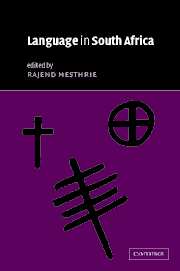Book contents
- Frontmatter
- Contents
- List of maps
- List of contributors
- Acknowledgements
- List of phonetic symbols
- List of abbreviations
- Introduction
- Part I The main language groupings
- Part II Language contact
- 9 Fanakalo: a pidgin in South Africa
- 10 Mutual lexical borrowings among some languages of southern Africa: Xhosa, Afrikaans and English
- 11 Code-switching, mixing and convergence in Cape Town
- 12 Code-switching in South African townships
- 13 Intercultural miscommunication in South Africa
- 14 Women's language of respect: isihlonipho sabafazi
- 15 The sociohistory of clicks in Southern Bantu
- 16 The political economy of language shift: language and gendered ethnicity in a Thonga community
- 17 From second language to first language: Indian South African English
- 18 Black South African English
- 19 The lexicon and sociolinguistic codes of the working-class Afrikaans-speaking Cape Peninsula coloured community
- 20 An Introduction to Flaaitaal (or Tsotsitaal)
- 21 Language and language practices in Soweto
- Part III Language planning, policy and education
- Index
- References
13 - Intercultural miscommunication in South Africa
from Part II - Language contact
Published online by Cambridge University Press: 22 September 2009
- Frontmatter
- Contents
- List of maps
- List of contributors
- Acknowledgements
- List of phonetic symbols
- List of abbreviations
- Introduction
- Part I The main language groupings
- Part II Language contact
- 9 Fanakalo: a pidgin in South Africa
- 10 Mutual lexical borrowings among some languages of southern Africa: Xhosa, Afrikaans and English
- 11 Code-switching, mixing and convergence in Cape Town
- 12 Code-switching in South African townships
- 13 Intercultural miscommunication in South Africa
- 14 Women's language of respect: isihlonipho sabafazi
- 15 The sociohistory of clicks in Southern Bantu
- 16 The political economy of language shift: language and gendered ethnicity in a Thonga community
- 17 From second language to first language: Indian South African English
- 18 Black South African English
- 19 The lexicon and sociolinguistic codes of the working-class Afrikaans-speaking Cape Peninsula coloured community
- 20 An Introduction to Flaaitaal (or Tsotsitaal)
- 21 Language and language practices in Soweto
- Part III Language planning, policy and education
- Index
- References
Summary
INTRODUCTION
In this chapter I will be reviewing a selection of intercultural and cross-cultural studies of communication in apartheid South Africa. My purpose in doing so is, first, to distinguish between cross-cultural and intercultural communication studies in terms of the theories that inform and the research methods that are used in them. Second, it is to explore what each type of study has contributed to an understanding of the sources and consequences of intercultural miscommunication in South Africa and, more generally, of how dominant ideologies and power relations associated with them affect, and are affected by, the quality of such communication.
In sociolinguistics, as elsewhere, the terms ‘intercultural’ and ‘cross-cultural’ tend to be used interchangeably. However, following Carbaugh (1990: 292), I distinguish between them, reserving the term ‘cross-cultural’ for studies that explore particular features of communication (e.g. compliments, refusals, apologies, turn-taking) across two or more cultures. I use the term ‘intercultural communication’ to refer to studies that, by contrast, focus on particular intercultural encounters, and attend to whatever communication features are salient in them.
CROSS-CULTURAL COMMUNICATION STUDIES
Among the communication features most extensively investigated crossculturally are speech acts. Researchers who investigate cross-cultural diversity in the rules for the performance of speech acts (refusals, promises, accusations) or speech-act sequences (invitations–acceptances/ rejections) have drawn eclectically from the philosophic tradition of linguistic pragmatics, from the anthropological tradition of the ethnography of communication and from the sociological tradition of conversational analysis. Linguistic pragmatics contributed a number of theoretical understandings.
- Type
- Chapter
- Information
- Language in South Africa , pp. 258 - 276Publisher: Cambridge University PressPrint publication year: 2002



